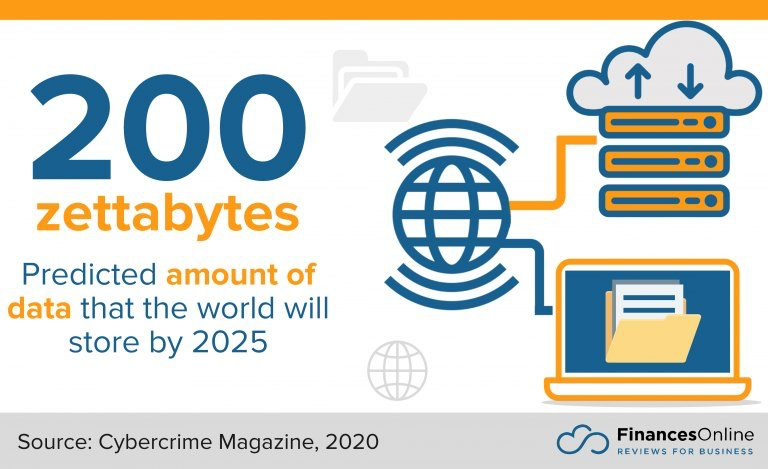Today’s world is absolutely filled to the brim with data of all shapes and sizes, more and more of which is being generated each day. By the start of 2020, people had generated 44 zettabytes of information with their digital activities. That figure is only going to increase in the years ahead.
21st-century businesses need to think about how they manage and use the data they continue to rapidly accumulate. That’s where data management software comes into play. We’ll explain what data management involves and some of the benefits it brings to small businesses.
What Is Data Management Software?
Today’s businesses have a lot of data to sort through. This data is generated when customers sign up for services, when they make transactions, or even when they interact with your business more generally – through channels like social media or simply visiting your website, for example.
The data a business accumulates can be helpful. By understanding the activities of your customers, you can make better business decisions. However, you can’t interpret this data unless it’s been organized properly—which becomes harder when we consider how widely today’s data can be distributed and simply how much of it there is.
That’s where data management comes into play. It collects and organizes data in a way that is useful to you—augmenting things like gut-based guesses—while also protecting it from theft. Data management is typically achieved using a specialized piece of software, which can consolidate data from different sources before analyzing and visualizing it.
Data management is used by a variety of industries, including retail, banking, and manufacturing. It allows businesses to perform particular tasks better, like responding to customer expectations and managing inventory. It’s also useful for various business sizes—including small ones—and can help you better understand concepts like database ACID.
What Does Data Management Software Do for Small Businesses?
In some respects, it does the same thing as it does for large businesses. All businesses today (whether large or small) generate data, whether they aim to or not. Therefore, it makes a lot of sense to do something with it.
Of course, if you’re looking for practical benefits, there are four major components for small businesses to be aware of:
1. Increased Productivity
Data management means that all the data flowing into your business is organized. This, in turn, means that we can actually access it. Having this central, practical resource ensures that you and your employees can all use your time more effectively—as you aren’t wasting it in futile pursuit of something you need, like how much of a particular resource you have.
Data management also means you’re able to share information with one another more easily. Since even small businesses rely on teamwork, being able to work together effectively is a must.
2. Better Security
The terminally-online, vastly interconnected nature of today’s world means a lot of the data we produce is sensitive. You need to make sure that the data your business has can be protected from theft, leakage, or simply irrecoverable loss. If you don’t, your business and customers could suffer financial or reputational harm.
A major part of data security is understanding what, exactly, you need to protect. Data management software provides a comprehensive record of what you need to think about.
Crucially, however, it also comes with encryption and authentication functionality. This makes it much harder for bad actors to access your data. In the event that data gets lost, good data management software backs it up to avoid any unpleasant situations.
Make sure to protect all facets of your business by improving front-end security for your websites as well.
3. Higher Quality Decision-Making
All business leaders have to make multiple decisions each day, which data management software makes easier. This is because this kind of software can actively improve your data’s quality by standardizing, parsing, and verifying the data you give it. Crucially, it does so automatically – meaning there’s only so much oversight you need to give.
Data management software also aids decision-making by blending different data types together. It allows the software to offer new business insights—and even answer questions you hadn’t considered before. This is another aspect of data management you can automate.
More importantly, data management software helps your employees to trust your decision-making. This is because the way you have come to such a decision is more transparent than it may have been in the past.
Indeed, better decision-making is a particular benefit of data management software for small businesses. A larger business can recover from a flawed business decision more easily than a small business can, as the former (obviously) has more resources to work with
4. Better Use Of Funds
Indeed, while it may come with some initial costs upfront, data management software can save you money. Demystifying a business’ inner workings prevents situations like data duplication, conducting the same research multiple times, or re-running expensive queries. All these cost your business money, and you could easily avoid them with the right software established.

Naturally, the improvements to decision-making have an impact here as well. Making an informed decision means you’re more likely to see a return on any investments you make, which you can then re-invest into your business going forward.
The Takeaway
Data management software can seem like an extravagance, especially if your business is on the smaller side. However, it can be a very useful tool for day-to-day business operations.
Managing your data ensures you can interpret and share it more effectively than before. Crucially, it also helps to keep it safe from theft or accidental loss. All small businesses should consider data management software if they want to maintain their edge.


